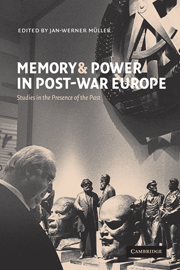Book contents
- Frontmatter
- Contents
- List of contributors
- Acknowledgements
- Introduction: the power of memory, the memory of power and the power over memory
- Part 1 Myth, memory and analogy in foreign policy
- Part 2 Memory and power in domestic affairs
- 7 The past is another country: myth and memory in post-war Europe
- 8 The emergence and legacies of divided memory: Germany and the Holocaust after 1945
- 9 Unimagined communities: the power of memory and the conflict in the former Yugoslavia
- 10 Translating memories of war and co-belligerency into politics: the Italian post-war experience
- 11 Institutionalising the past: shifting memories of nationhood in German education and immigration legislation
- 12 Trials, purges and history lessons: treating a difficult past in post-communist Europe
- Index
12 - Trials, purges and history lessons: treating a difficult past in post-communist Europe
Published online by Cambridge University Press: 22 September 2009
- Frontmatter
- Contents
- List of contributors
- Acknowledgements
- Introduction: the power of memory, the memory of power and the power over memory
- Part 1 Myth, memory and analogy in foreign policy
- Part 2 Memory and power in domestic affairs
- 7 The past is another country: myth and memory in post-war Europe
- 8 The emergence and legacies of divided memory: Germany and the Holocaust after 1945
- 9 Unimagined communities: the power of memory and the conflict in the former Yugoslavia
- 10 Translating memories of war and co-belligerency into politics: the Italian post-war experience
- 11 Institutionalising the past: shifting memories of nationhood in German education and immigration legislation
- 12 Trials, purges and history lessons: treating a difficult past in post-communist Europe
- Index
Summary
The question of what nations should do about a difficult past is one of the great subjects of our time. Countries across the world have faced this problem: Chile, Argentina, Uruguay, El Savador, Spain after Franco, Greece after the Colonels, Ethiopia, Cambodia, all the post-communist states of central and eastern Europe today. There is already a vast literature, mostly written by political scientists, lawyers and human rights activists rather than historians, and mainly looking at treating the past as an element in ‘transitions’ from dictatorship to – it is hoped – consolidated democracy. Three invaluable, thick volumes, too narrowly entitled Transitional Justice, document the worldwide story up to 1995. The material for a fourth volume is even now being prepared in South Africa, Rwanda, Bosnia and The Hague.
Yet what exactly are we talking about? There is no single word for it in the English language. German, however, has two long ones in regular use: Geschichtsaufarbeitung and Vergangenheitsbewältigung. These may be translated as ‘treating’ the past, ‘working over’ the past, ‘confronting’ it, ‘coping, dealing or coming to terms with’ it; even – in the case of Vergangenheitsbewältigung – ‘overcoming’ the past. The variety of possible translations indicates the complexity of the matter in hand. Of course the absence of a word in a language does not necessarily indicate the absence of the thing it describes. Byron remarks somewhere that while the English do not have the word longeurs they have the thing in some profusion.
- Type
- Chapter
- Information
- Memory and Power in Post-War EuropeStudies in the Presence of the Past, pp. 265 - 282Publisher: Cambridge University PressPrint publication year: 2002
- 5
- Cited by



